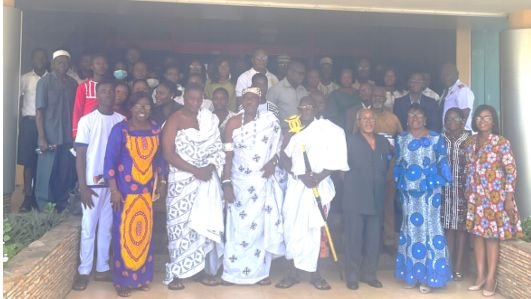
Stakeholders and collaborators of the Sickle Cell Condition Advocates (SICCA) have called for more advocacy on sickle cell, especially before marriage.
They noted that testing among couples, especially soon-to-be-married couples, should not be a last-minute decision in order to help prevent producing more sickle cell patients in the country.
In Ghana, about 16,000 babies are born with sickle cell each year, meaning 22%-25% of the population have sickle cell traits.
To this end, they charged faith-based organisations (FBOs) to make it a point to educate their congregants on the need for testing to complement the ongoing efforts made by SICCA.
The call was made at the First Conference on the Prevention of Sickle Cell Disease in Accra, an event to mark World Sickle Cell Awareness Day which is observed annually on June 19.
National strategy
In a speech read on his behalf, the Minister of Health, Bernard Okoe Boye, said although Ghana is challenged with inevitable infrastructure and clinics for sickle cell disease, the government was working on a national non-communicable disease policy.
“It’s the national strategy for sickle cell disease, which is currently under development. The national strategy for sickle cell disease represents a significant milestone in our ongoing efforts to address sickle cell disease in Ghana,” he said.
“I think the remarks made here have alluded to the fact that we cannot do it alone. Including labour, academia, our faith-based organization, including our chiefs, we all need to come together to push this agenda forward,” he added.
Dr. Okoe Boye expressed the commitment of his ministry to ensuring that even beyond the strategy, everybody, including the national technical working group for sickle cell, works to ensure the implementation of the plan that has been noted in the strategy over the next five years and beyond.
“We strongly hold fast to the belief that empowerment begins with education. By enhancing awareness about sickle cell disease, as SICCA is doing, we hope that individuals with the information will make informed decisions about their health,” he said.
The Minister added: “Knowledge is a powerful tool that we believe can break down barriers, dispel all misconceptions, promote end detection and intervention. However, knowledge alone is not enough, it must be coupled with action.”
Disease management
Responding to a question during a panel session at the event on whether a sickle cell patient can be cured, Dr. Mavis Sakyi, a representative from the Health Ministry, disclosed that the condition is managed in Ghana although in advanced societies, studies are ongoing for a cure.
“Currently, in the advanced world, a few innovative technologies are coming up. Some trials have said that a bone marrow transplant can be done. But studies are being done to ensure once the trials are done the disease never returns,” she said.
“Until Ghana gets there, we manage the symptoms. We manage all the infections, pains, discomfort, and all the adjoining issues that come up. But we prevent it by ensuring that we don’t give birth to a child with the disease,” she added.




